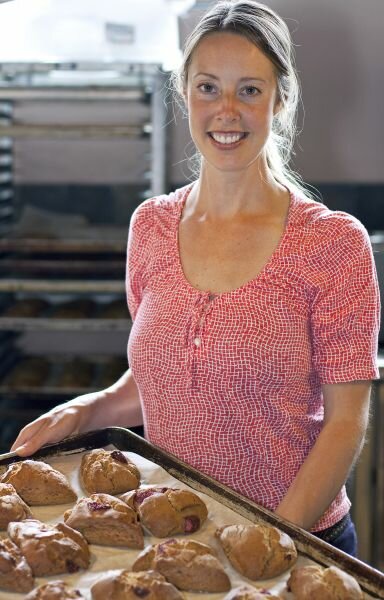Eat bacon. Tape bacon to your cat. Wear a bacon hat to work. Whatever gets a conversation started is okay by Jonathan Safran Foer, author of Eating Animals, as long as we all sit around and talk about bacon. Maybe later we'll hold hands and sing Kumbayah.
Despite the title of his latest book, Foer is no firebrand. Foer's intent, repeated several times, is to widen the conversation in America about industrial animal agriculture, i.e. factory farming, CAFO's, slaughterhouses, et cetera.
He doesn't want to alienate anyone, or put them on the defensive. At Town Hall, last night, he was so restrained and moderate that I would have been shocked that he was the author, if I hadn't already seen his appearances on The Colbert Report and Ellen. As it happened, the only shocking thing about Foer's talk was the lack of passion evinced from the podium.
The result was a bland and forgettable chat about a topic that should be infuriating and revolution-inspiring. My more carnivorous friends and peers (who uniformly turned down invitations, because they "liked eating animals" [Ed.: I actually said that to Constance!]) could have attended, and still felt completely comfortable going out for a beer and a burger afterward. Ironically, during his introductory remarks, Jonathan Safran Foer told the audience that before he started touring, he feared people showing up to throw ground beef at him. That hasn't happened, but I sort of wish it had. Maybe such a confrontation would have radicalized Foer's delivery....
We visited Cafe Flora (29th & Madison) earlier this year to try out their breakfast menu; this time they invited us down to see the backyard patio and sample options from their cocktail menu (pdf). Click through the gallery for glimpses of vegetarian and vegan takes on cocktail hour.
Cafe Flora opened in 1991, the year I moved to Seattle, though the two events are largely unrelated. I do remember my first meal there, and the thrill that came with eating vegetarian fare that wasn't trying to taste like a meat dish. Everything celebrated precisely what was on your plate.
Now there's a new(ish) owner, Nat Stratton-Clarke, who started five years ago as a buyer, became general manager, and then took over the reins completely when founding owner David Foecke wanted to move on. So while Café Flora lives on, new approaches to menus and décor are being tried out.
To go with the cocktails, there's a Happy Hour: Monday through Friday, from 3-6 p.m., they offer select beers at $2.50, wines at $5, and a daily cocktail at $5. For the ultimate escape from a hectic day, make tracks for the back patio, and try the intensive garden immersion therapy it provides.
PETA kicked off the Seattle Green Festival one day early, with a demonstration at noon at Westlake. Partly obscured by a banner reading, "Clean Your Conscience: Go Vegan! 1 lb. of Meat = 6 Months of Showers," two naked PETA models "showered" in the great outdoors of the pedestrian plaza. Look for all the hot nude action on your local TV news tonight (KOMO 4 and KING 5 KIRO 7 were there).
It's green wisdom that reducing the meat in your diet is a good way of reducing your contribution to CO2 emissions. PETA says why not go whole hog, and leave the hog alone? They quote researchers at the University of Chicago, who "determined that switching to a vegan diet is more effective in countering climate change than switching from a standard car to a Toyota Prius."...
 Jennifer Katzinger (Photo: Rachelle Longé)
Jennifer Katzinger (Photo: Rachelle Longé)
"I had been exposed to gluten-free at a juice bar in Greenlake years ago, and I was baking there and I really had fun working with all their different flours, and so I was just familiar with other grains," Jennifer Katzinger said. "And so I just got thinking, there are so many baked goods you can get in the Northwest, but finding a baked good that is with whole grains, or dairy and egg-free was hard. Organic too. Hence the Flying Apron."
Katzinger and I were sitting in the corner of the Walnut Street Coffeehouse in Edmonds, her nine-month-old daughter Lily, wearing a white knit sweater, playing on the seat between us. Charming and enthusiastic, Katzinger was telling me about the genesis of her vegan, gluten-free bakery, which she opened with her father in the University District in 2002. Eight years and two moves later, the Flying Apron is still going strong, and in addition to recently becoming a mother, Katzinger is now an author: in November, Sasquatch Books published her first cookbook, Flying Apron's Gluten-Free and Vegan Baking Book ($21.95).
A Northwest native, Katzinger grew up baking. In her early teens, she was already working at Lake Street Bakery ("That was a warm and cozy and delicious atmosphere, and I felt so safe there"), but after getting her BA in English Lit at the UW, she pursued a degree in industrial design at the Pratt Institute in NYC before returning to Seattle. When her and her father, both in need of new career directions, decided over coffee one morning to open the Flying Apron together, the concept wasn't as expressly gluten-free as it eventually became. While Katzinger was an on-and-off again vegan, originally the bakery featured a couple items that used egg and dairy--the idea was to have something for everyone, and the gluten- and wheat-free products were as much a creative touch as a conscious choice.
What led Katzinger to purge her work of gluten and wheat was the ecstatic response of customers. Wheat and gluten intolerance are actually common allergies, and on top of that, there's Celiac disease, in which wheat gluten wreaks havoc on the small intestine. The responses of her customers, some of whom would burst into tears when they found themselves in a bakery they could actually eat at, deeply affected her.
"The symptoms are so broad and different," Katzinger told me of the various stories her customers have shared. "One woman, a really beautiful woman who'd come to the bakery often, she traveled for work a lot, and she had been gluten-free for a long time, and had to go to Italy on business. And she thought, 'What the heck? I'm going to have the lasagna.' And for her, it was actually something like a schizophrenic type of situation. She had an episode, and just realized she can't go down that road."
"And other people, it just took them so long to be diagnosed Celiac. I remember this young woman coming in, I think she was going to the UW, and for years she was going to the hospital with digestive issues. And they would say, 'Oh, you need to eat more bran.' And so she would eat more bran and keep going in, and they would say, 'Oh, I think maybe you have something mentally going on, because we don't see anything wrong with you, and yet you keep complaining about your digestive issues.' So they put her on anti-depressants, and she went to Bastyr after that, where they did an allergy test and a Celiac test, and said, 'You have Celiac, there's no reason for you to be on anti-depressants.' So there's some really unusual stories out there, but in the U.S. they're pretty common. I think it takes, on average, 11 years to be diagnosed with Celiac's disease."
In order to create the rich variety of tasty baked goods that have garnered her attention, Katzinger experiments with and uses a wide-variety of alternative flours and sweeteners. Her list of staple ingredients includes at least nine flours: brown rice, garbanzo bean, buckwheat, teff, quinoa, corn, fava bean, chestnut, and hazelnut. Her goods are also organic and avoid most highly-processed ingredients; she doesn't use standard sugar, and many recipes call for non-sugar sweeteners like agave syrup, maple syrup, or concentrated fruit juice.
Katzinger also tries to locally source as much as possible. Asked where she came by hazelnut flour, she exclaimed: "Holmquist Farms! They sell hazelnuts and hazelnut oil and hazelnut flour at the farmers' markets! And I think they're in some of the grocery stores, now."
The recipes in the book range from sweet morning pastries to cookies to cakes to breads. Asked whether any of the recipes were particularly meaningful to her, she told me, "The pecan pie recipe is very special, because my husband was very involved with that one. That was early on, when we met each other, that we did that recipe together. I met him through the bakery, actually. He was a customer, and he would come to the take-out window in the University District frequently, and we just became friends. I was going to delivery my very first wedding cake, and I was really nervous about it, just kind of sharing this with him not so much to invoke an invitation to help, but in any case, that's indeed what happened. He said, 'Can I give you a hand with that?' And I took him up on it, and we had a great time."
For eight years, the Flying Apron was Katzinger's life, and in some ways the cookbook represents the apex of that career. "I dedicated the cookbook to Lily," she said, looking down at her daughter, who'd long since let all her toys slip to the floor and was now playing with a saucer, sitting in her mom's lap.
"I wrote it while I was pregnant with her, and finished it right before she was born. And since her arrival, it's just completely changed me. Before she arrived, the bakery was what I gave my all to, my absolute all to. Since she's been in the world, it's been a wonderful experience, but it's been hard to give my all to the bakery and to give to my daughter, which is what I want to do. I didn't see that coming. I mean, I knew I'd love being a mom, but I had no idea how powerful that is."
She smiled at her daughter, who'd given up on the saucer and was now pawing her mom's face. "So I've actually just sold the bakery, believe it or not. The first day of my not being the owner was January first."
Katzinger is remaining on as a recipe consultant, developing new recipes when not dedicating herself to parenting. For her, it's apparent that the joy of baking is no longer the only reason to continue her work--today, Katzinger seems as inspired by the need for food like hers as the joy she gets from creating it.
"In my young adulthood, there were times when--I wasn't allergic to food, but I made choices: to be a raw foodist at one point, a strict vegan at others," she told me. "And actually, I was unhealthy for a while, someone with real food issues. So while I don't know what it's like to have Celiac, I know what it's like--and this by my own choice, so there are differences but similarities, too--I know what it's like to be an outcast with eating. And how painful that can be. So for people who have allergies, or Celiac, I'm excited to share with them these recipes that I think so many people will enjoy, so they can have a table that's abundant, full of sharing of food and stories, and that's inclusive."
 Our SunBreak Flickr Pool delivers perfectly, thanks to mangpages.
Our SunBreak Flickr Pool delivers perfectly, thanks to mangpages.
Mainstream news is having a hard time reporting on Robert and Brenda Vale's study (actually a book) called Time to Eat the Dog? The Real Guide to Sustainable Living. CBS News begins its story like this: "So apparently Rover whizzing on the carpet isn't the worst thing he does. Not by a long shot. He's also killing the planet." Locally, the Seattle Times is more laconic: "Thanks for killing the planet, dog owners."
The upshot of the Vales' figurings is that the ecological footprint of a medium-sized or large dog, based on its food intake, is greater than that of an SUV (a 4.6-litre Toyota Land Cruiser) driven 10,000 km per year. (That's including both the SUV's fuel and the energy used to build it.)
While the book's title is clearly a provocation, the message gets lost in the weeds. In both stories, there's a lot of scoffing from the outset, even though the study's limited parameters have been backed up by New Scientist, in their article, "How green is your pet?"
The Times pitted our local eco-wonk, Sightline's Clark Williams-Derry, against New Scientist.
"When I saw the study I ran some quick numbers," Williams-Derry said. "The average dog has to eat at least twice as much as the average person for this to be right. People are just heavier than dogs so, I just had to scratch my head at that."
[UPDATE: I should have checked Sightline's blog before I wrote this: Clark picks the study apart on a number of its assumptions--not least of which is what we're actually feeding our dogs.]
One: Regardless of what the authors intended, the conclusion that should be drawn from the study is that eating meat, in general, is energy intensive. It doesn't matter who is eating the meat, you or your dog; it's costing an arm and a leg ecologically. That is not always the case, depending on who is raising the meat, but it's fair to say that our industrial meat producers don't tend to have sustainability top of mind.
That is why someone like Michael Pollan might suggest that "A vegan in a Hummer has a lighter carbon footprint than a beef eater in a Prius." He's had to retract that statement because of the "carbon" qualifier, which leads to a fairly strong criticism of the Vale's study. Inputs are not the whole picture--there are also outputs....





Most Recent Comments